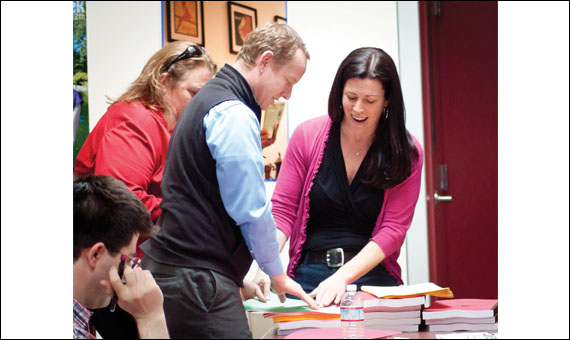
Every two years are the Olympics, every four years is leap day and every six years (or less) WASC comes to Aragon to evaluate the school. WASC stands for The Western Association of Schools and Colleges. The association is committed to making sure that schools’ students receive the best education they can get and need.
“Every six years the organization gets a committee together to visit each school and in preparation for that, the school has to prepare what’s called a ‘self study.’ That means we spend about eighteen months with students, parents and staff and teachers looking at every element at our school,” explained Holly Dietz who is the self-study coordinator.
So, how does this affect Aragon? In several ways. WASC comes to evaluate the school. Once they evaluate the school, they give a rating called a“term of accreditation.” The best a school can get–which is what Aragon received six years ago–is six years. The term of accreditation certifies that the school is giving students a quality education. Accreditation also recognizes that the school is continually improving.
“I think it’s very much on people’s mind thinking about how we can make things better for our students, how we can be the best possible teachers we can be…we’re beginning to take action and it’s an exciting time for the teachers and the staff. It’s one of those big moments where we’re going to be make big changes,” commented Dietz.
These big changes entail supporting students and helping them be confident about their ability to learn, improve Aragon’s program of under-performing classes, introducing and allowing access to resources that are helpful to students, and allowing students to be fully aware of ESLRs.
The WASC committee was on campus on March 4, 5, 6 and 7. “[WASC came] in to every classroom at some point, so every teacher [was] seen by them…they [met] with the focus groups and there [were] a couple students on each of those groups.
“They [also] [met] with the student leadership. They really like to do a meeting where they literally walk around and hand out passes randomly to kids. It’s called an “ad-hoc” student meeting. They go around finding kids that they think will have interesting input, hand them a pass and tell to ‘come to this meeting after lunch,’” explained Dietz. “The benefit of that is they’re [not going to get] students we pick for them, but the ones they want to [talk to]. And then of course, [WASC] is free to walk around during lunch and talk to whomever they please and may talk to students at any time.”
The focus groups WASC will be meeting with are made up students at Aragon from all grades, parents and teachers.
Junior Kevin Dwyer explained his experience with the committees. “I am the student representative in group C and we focus on the instructional portion of all the WASC work.”
“The meeting tends to begin with the entire staff, some parent volunteers, and students all sitting down together in the library. Mrs. Dietz tends to start off our meeting with some direction towards what we will be accomplishing that day. Then we break up into…groups. Each group works on a different part of the WASC [self-study report] to enhance the wording and meanings,” explained Dwyer.
Judy Kwee, one of the parent volunteers, shares her experience working with the committees. “My group was a group E: school culture and support for student personal and academic growth. For example, in connection with the goal of having a school that is a “safe, clean and orderly place that nurtures learning,” we discussed creating a different culture in the library—one more conducive for studying and quiet reading. In conjunction with that, we discussed the possibility of developing the student lunchroom into a comfortable place for students to socialize and ‘hang-out.’”
The point is to show that Aragon provides a relevant, rigorous, curriculum. So we look at “Critical Academic Needs” which are abbreviated as “CANS”. The purpose of including parents and students is to allow their input in the process, since we may see things differently than teachers,” commented Kwee.
“From a parent’s point of view, I thought the process was really valuable and educational. I learned a lot about what the teachers and administrators do at Aragon to provide a well-balanced learning environment, and how many programs there are to make sure that students have the opportunity to succeed, regardless of their academic level.”



